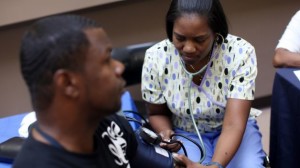Andy Lampkin, PhD
Regional differences in attitudes that may affect health behavior and willingness to participate in research among black Seventh-day Adventists
 Biography: Dr Lampkin received his bachelor’s degree from Oakwood College, after which he earned two master’s degrees, both from Vanderbilt University; an MA in Theological Studies (1995), and an MA in Religion, Ethical Studies (1998). In 2000 he earned his PhD from Vanderbilt in Religion, Ethics, and Society. Prior to joining LLU faculty in 2006 Dr. Lampkin held teaching appointments at Tennessee State University, University College, and Oakwood University; and was the Adventist Health Study II Director at the Oakwood University Office. His research and teaching interests range from professional ethics, the SDA health teaching tradition, and the role of clergy in disaster preparedness and response, and attitudes of Black Adventists to health. At present Dr. Lampkin is Associate Scholar, Center for Christian Bioethics, Associate Scholar Center for Christian Bioethics (School of Religion) in addition he is the Associate Professor, Religion – Ethical Studies (School of Religion) (http://www.llu.edu/religion/faculty-details.page#lampkin)
Biography: Dr Lampkin received his bachelor’s degree from Oakwood College, after which he earned two master’s degrees, both from Vanderbilt University; an MA in Theological Studies (1995), and an MA in Religion, Ethical Studies (1998). In 2000 he earned his PhD from Vanderbilt in Religion, Ethics, and Society. Prior to joining LLU faculty in 2006 Dr. Lampkin held teaching appointments at Tennessee State University, University College, and Oakwood University; and was the Adventist Health Study II Director at the Oakwood University Office. His research and teaching interests range from professional ethics, the SDA health teaching tradition, and the role of clergy in disaster preparedness and response, and attitudes of Black Adventists to health. At present Dr. Lampkin is Associate Scholar, Center for Christian Bioethics, Associate Scholar Center for Christian Bioethics (School of Religion) in addition he is the Associate Professor, Religion – Ethical Studies (School of Religion) (http://www.llu.edu/religion/faculty-details.page#lampkin)
Today we will focus on Dr. Lampkin research in the regional differences in attitudes that may affect health behavior and the willingness to participate in research among black Seventh-day Adventists. Consistent with this, it is important to point out that National surveys have reported for the past several years that the “physical and mental quality of life in black Adventist in some cases is a 4.5 percentage points better than the average American” says Jerry Lee, PhD, MA, RN, principal investigator for the Adventist Religion and Health Study (ARHS) (http://www.sciencedaily.com/releases/2011/06/110627183946.htm)
So the question remains why the difficulty and unwillingness of some blacks to participate in health research studies.  Like most black Americans who recognizes the racist society we live in, it comes down to the overall “skepticism, fear, and mistrust of all academic medicine and the lack of understanding of the nature of any and all medical research.”
Like most black Americans who recognizes the racist society we live in, it comes down to the overall “skepticism, fear, and mistrust of all academic medicine and the lack of understanding of the nature of any and all medical research.”
So the question we must ask our self as a society and health professionals, how do you change this behavior and the way of thinking, particular this segment of individuals who we have pinpointed for research who are blacks in the Adventist organization.
In addition with such a low participation it becomes difficult and potentially detrimental for the treatment and funding of most diseases that disproportionately affect blacks in general. So the attitude is now in trying to focus research in various regional parts of the country somewhat like most conferences are set up throughout the United States which seems to have a greater success rate as researchers attempt to plan their recruitment efforts in their attempt to solve the overall problem recruiting blacks for health research.
 Dr. Lampkin’s research also brings into account the importance of research with Black Adventist in that “health and well-being, and health promotion are an important aspects of their faith tradition and group identity” that is why research is beneficial because Most Adventist like the wording in our constitution which states “separate but equal” which was the legal doctrine that justified and permitted racial segregation. Adventist as a whole are integrated within all regional communities but are separated by their above average and overall health and dietary practices.
Dr. Lampkin’s research also brings into account the importance of research with Black Adventist in that “health and well-being, and health promotion are an important aspects of their faith tradition and group identity” that is why research is beneficial because Most Adventist like the wording in our constitution which states “separate but equal” which was the legal doctrine that justified and permitted racial segregation. Adventist as a whole are integrated within all regional communities but are separated by their above average and overall health and dietary practices.
So as Dr. Lampkin research is able to conduct research on Black Adventist and their Non Adventist Neighbors, it will have “broad application beyond the Adventist community.” Which will be beneficial to the overall black community in integrating health reform for all blacks. Research also shows that in the North and south areas of the country there is also overall differences which would provide additional insight and “help researchers design their recruitment efforts with greater overall success in health issues among blacks.” throughout the country http://www.ncbi.nlm.nih.gov/pmc/articles/PMC3433048/
Speak Your Mind